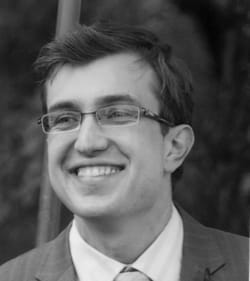I’m what the folks in admissions like to call a “nontraditional applicant.”
High-school dropout. Compost farmer. Insurance salesman. Recovering hippie.
I came to Wharton expecting to be immersed in the world of business, and my first year exceeded those expectations. It was a whirlwind of accelerated learning, frantic job-searching and constant inspiration by an incredible group of classmates. Yet the most powerful aspect of my time at Wharton has been something I never saw coming: The personal and emotional growth I have achieved through the Wharton Leadership Program.
The defining moment of my Wharton career was the day of the Learning Team Retreat when I first met my teammates.
The strength and cohesiveness of one’s learning team shapes the first-year MBA experience here at Wharton. While some learning teams gel immediately, others struggle. My team fell squarely into the latter category. As someone who consistently excelled in individual coursework, my first inclination was to blame the other members for our poor performance. But through the 360-review process and the mentorship of Professor Greg Shea and Deputy Vice Dean for Student Life B. Kembrel Jones, I came to understand my role in our shortcomings.
The message I heard from my teammates during our first 360-review session came as a, well, surprise: While they admired my intellect and appreciated my willingness to take on a significant workload, they found me intimidating and unwelcoming to others’ ideas. I was floored. This was my first real experience working on a team that provided organized feedback, and I was unaware of how my actions were negatively affecting my teammates. I am intent on pursuing a career in consulting, but I realized at that moment that my capacity for analytics and eagerness to learn would not help me one bit unless I was able to thrive in a team environment. I knew I had to change.
So it was with a newfound dedication to active self-improvement that I met with Prof. Shea. He taught me about the importance of active listening, and how the practice would allow me to gain more from working with others. In my meeting with Deputy Vice Dean Jones, meanwhile, I learned the importance of establishing connections with others and learning to engage with my teammates in a more casual and personable style. I emerged from these discussions inspired to become a better leader and team member.
Thus, I changed my approach to my learning team. With newfound awareness of how my intensity had discouraged others’ contributions, I began speaking less and asking more questions. I also made an effort to get to know my teammates on a personal level outside of the classroom.
It worked. I saw a noticeable change in the mood of the meetings, and was able to learn more from my teammates. The quality of our work improved as everyone showed themselves eager to contribute. During our second round of 360-reviews, my teammates stated that my listening skills and openness to new ideas had shown significant improvement, and that I had become a more pleasant person with whom to work. It was a major step forward.
The true test, however, came during my summer internship at the Boston Consulting Group. Consulting thrives on the notion that a team of people working together will always create more valuable analysis than an individual working alone. As such, I knew that the success of my internship hinged mostly on my ability to drive value through my team.
Though my feedback sessions reflected the fact that I still have room to improve, my fellow interns were confident that I have the potential and drive to become an excellent consultant. BCG apparently believes that, too: I will be returning to work full-time at the firm after graduation. Without the insights I gained during my first year at Wharton, I am certain my internship would not have been nearly as successful.
Wharton has had an enormous impact on my life. I’ve learned a great deal about business. I’ve built an incredible network of peers. I’ve landed my dream job. I’ve forged strong friendships. Yet as I prepare for the next phase of my life, and pursue my aspirations both professionally and personally, I believe the greatest lesson I will take from my time at Wharton is the importance of being a good teammate—and, by extension, a good leader.
Greg Emerson, WG’10, is from Berkeley, California.

























